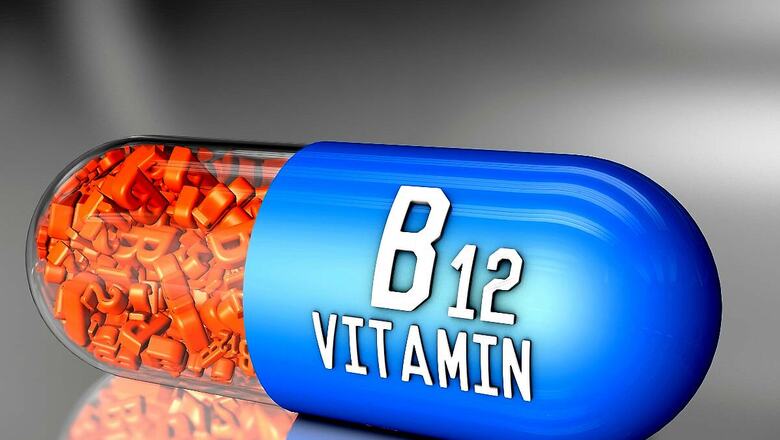
views
A 50-year-old woman, named Rajshree, was experiencing severe tingling, burning, and pain in her hands and feet for a duration of six months. These symptoms significantly impacted her sleep and overall quality of life.
Her doctor, Dr Sudhir Kumar – head of the department of neurology at Apollo Hospitals in Hyderabad – linked the nature of the symptoms to “peripheral neuropathy”, indicating potential nerve damage. Investigations identified a deficiency of Vitamin B12 – a water-soluble vitamin which is excreted daily from the body through urine.
Rajshree was predominantly on a vegetarian diet, with non-vegetarian intake occurring only once every 7-10 days, contributing to the deficiency.
Following a thorough evaluation, she started treatment with Vitamin B12 injections and medications, and after six weeks, her condition substantially improved.
Symptoms of Deficiency Mimic Other Conditions
Recognising the signs of Vitamin B12 deficiency can be challenging as symptoms can be subtle or mimic other conditions – making diagnosis more confusing. For instance, mood changes.
Sample this: Everything was fine until 15 days ago when Ganesh’s wife noticed a change in his mood. The 40-something had started getting upset without any apparent reason and became irritable on multiple occasions. He also experienced two episodes where he briefly lost awareness of his surroundings for about 10 seconds, with no recollection of what happened during those moments.
On detailed assessment, it was found that Vitamin B12 deficiency was causing breakthrough seizures and behavioural disturbances. Ganesh was a strict vegetarian. He had a medical history of epilepsy.
Vitamin B12 deficiency is also a known cause of hearing loss and tinnitus. Hence, for people suffering from unexplained hearing loss and/or tinnitus, testing Vitamin B12 is advisable.
A user on X (formerly Twitter) shared her experience of inaccurate diagnosis about her mother. “My mother’s B12 levels dropped to the low 40s after she was incorrectly treated for gastritis. She lost her hearing permanently and developed tinnitus. B12 levels are back to normal with injections and meds (medicines), but the damage is done.”
Kumar from Apollo also shared an instance where an elderly lady was misdiagnosis with Parkinson’s disease due to shaking of her hands. She was Vitamin B12 deficient instead, which is known for causing tremors. She was facing problems eating, writing and drinking, but was cured well with a course of supplements.
Many of Us Silently Suffer from B12 Deficiency
Kumar from Apollo added that in his OPD, he diagnoses almost two to four patients daily who are reporting symptoms due to a deficiency of Vitamin B12. “So, that’s about 50-60 cases per month.” “Early diagnosis and prompt initiation of treatment results in good clinical improvement,” he said.
While a deficiency of Vitamin B12 is easily treatable, the lack of vitamin causes serious complications, including peripheral neuropathy, dementia, psychosis, tremors, depression, seizures and megaloblastic anaemia.
It also causes tiredness, sore tongue, confusion, memory loss and weakness. It is important for healthcare providers to be aware of the symptoms of B12 deficiency to accurately diagnose the illness.
Dr Sumit Ray at the Holy Family Hospital in New Delhi exclusively attends to patients in intensive care units rather than in outpatient departments (OPDs). According to him, B12 deficiency is ‘fairly common’ in the elderly and vegetarians. “In ICUs, almost a quarter to a third of patients will be deficient.”
What is Vitamin B12 & How it Works
Vitamin B12, also known as cobalamin, is naturally present in animal-derived foods. Hence, the deficiency is diagnosed more often among vegetarians.
Vitamin B12 plays a crucial role in the formation of red blood cells and DNA. Moreover, it is essential for the proper functioning and growth of brain and nerve cells.
Vitamin B12 sticks to the protein in the food we eat. In the stomach, acid and enzymes help release Vitamin B12 so it can move around freely. After that, it teams up with a protein called intrinsic factor to get absorbed deeper into the small intestine.
According to Harvard TH Chan School of Public Health, The Recommended Dietary Allowance for men and women aged 14 years and older is 2.4 micrograms (mcg) daily. During pregnancy and lactation, the amount increases to 2.6 mcg and 2.8 mcg daily, respectively.
The rich food sources for B12 include fish, meat, eggs and poultry. However, dairy products such as milk, cheese, and yoghurt also include the vitamin.
Who Should be More Careful?
Vegetarians and vegans who exclude animal-based products from their diet are at a higher risk since Vitamin B12 is mainly found in animal sources.
Older adults, individuals with gastrointestinal disorders or surgeries that affect nutrient absorption, and those taking certain medications may also be more prone to deficiency.
According to experts, certain medications can disrupt absorption and can have significant effects. For instance, prolonged usage of metformin, a frequently prescribed drug for Type 2 diabetes, is closely linked to Vitamin B12 deficiency and decreased folic acid levels. Also, proton pump inhibitors and histamine blockers, commonly prescribed to reduce stomach acid, are connected with diminished Vitamin B12 levels.
For individuals following a plant-based diet, fortified foods like plant-based milk, cereals, and nutritional yeast can be good alternatives.
Oral supplements or B12 injections help to restore the B12 levels in the human body. The deficiency can be detected by a simple blood test. Experts also suggest an antibody factor panel test to confirm if the body is able to digest B12 through supplements as in some cases people can develop a Vitamin B12 deficiency if there are antibodies in the gut that interfere with absorption of Vitamin B12.
Recognise your symptoms, talk to healthcare practitioners and repair the deficiency before it causes permanent damage.

















Comments
0 comment